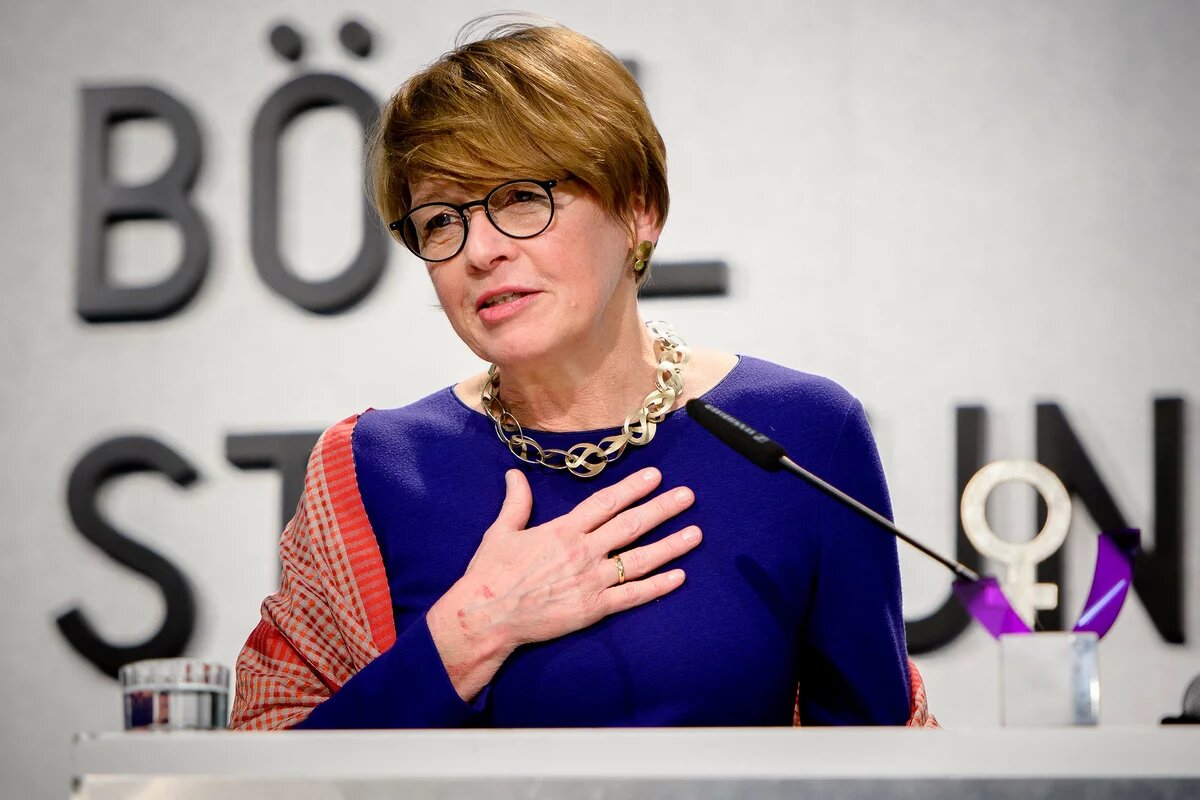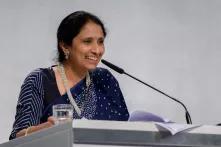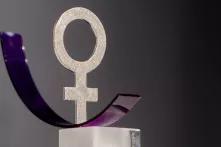On 6 March 2020, the women and human rights activist Prasanna Gettu was awarded the Anne Klein Women's Prize. Elke Büdenbender gave the laudatory speech.

Ladies and gentlemen,
two years ago this months I visited India or, to be precise, I went to Chennai. I remember the images as if it were yesterday – women, slowly performing one movement after another. What they were doing was physiotherapeutic exercises and they did them very carefully and slowly. Some of the faces were disfigured by burns, and their arms and/or legs were covered with bandages. All of them were victims of arson attacks – arson attacks committed by members of their own or their husbands families.
I remember a woman who was hardly able to move her fingers. Still, with the utmost determination, she tried to plug small metal rods into equally small holes on a wooden board in order to retrain her fine motor skills. It was obvious, each movement commanded a great effort. Still, she persisted – that was plain to see – because she was in a place that strengthened her will to fight on. Of course, the foremost objective is to heal the body and, as much as possible, the soul. However, the staff members here also clearly showed her that she had a right to a better life, a life free of violence and, yes indeed, also a life lived in ways determined by herself, meaning, it was up to her to decide what she would like to do and what was important to her. She had learned – or was in the process of learning – that what had happened wasn‛t because of her, wasn‛t her fault, but was solely the responsibility of those who had committed the arson attack.
For us this may seem obvious. For many women in India, however, women who have lived through similar experiences, this is not the case, at least not initially. Time-honoured traditional gender roles run deep and, according to them, women have to be subservient – despite the fact that there are many confident, emancipated women in India, women who live their own lives, such as today‛s awardee. During my visit, I also had the opportunity to meet women‛s rights activists of different generations.
The images of the women burn victims are etched in my memory because they moved me deeply – moved me and impressed me.
At the time, I was fortunate to be able to visit a facility of a non-governmental organisation, the International Foundation for Crime Prevention and Victim Care (PCVC). The director gave us a guided tour of the facility and told us about her work. I remember how impressed I was with this delicate yet strong woman fighting for women‛s rights in a country such as India – because, although, India‛s constitution guarantees the rights of women, and there are many additional laws and, by now, also wide-ranging public debate on the issue, still, the stark social reality for most women in India is that they are systematically discriminated against. Traditional role models run deep and still dominate daily life. In the Global Gender Gap Index published by the World Economic Forum, India, in 2018, was ranked 108 out of 149 countries – and it dropped to 112th place in 2019. The UNDP‛s Global Gender Equality Index ranks India at 95 out of a 129 countries. In India, violence and sexual assaults against women present a massive issue. According to UN Women (2016), 29% of women have been victims of sexual or other forms of violence within their relationships.
I don‛t want to rattle off too many numbers, yet the ones mentioned help to show in what kind of environment this courageous woman pursues her mission. They help to put into relief the giant scale of the task she is tackling.
Ladies and gentlemen,
the woman I am talking about is Dr. Prasanna Gettu who, tonight, is being honoured with the Anne Klein Women‛s Award. Each year the Heinrich Böll Foundation is giving this award to women who have made outstanding contributions to gender democracy, and, in this regard, it is hard to think of an awardee more deserving then Dr. Gettu.
Since 2001, she has been campaigning for women‛s rights in India, as 2001 was the year when she, together with two fellow students, founded PCVC, an organisation caring and campaigning for the victims of interpersonal and domestic violence. The support team consists of psychologists, social workers and former victims. The crisis intervention service helps the affected women with information about how to deal with the police, supports them in conversations and mediation with their families, offers legal advice and medical aid, as well as dedicated support options for children and assists them, if they want to leave their homes.
Over the years, PCVC has widened its range of support options according to the needs of women and their children. For example, police stations with specially trained, female-only officers were set up, as the affected women tended to trust women, rather then men. When Ms. Gettu noticed that many women brought their children along, she created shelters that could house women and children – places where they were able to recover and would receive support towards building a new future.
They also developed a therapeutic programme named Smiles, aimed at child victims of domestic violence, because they had found that boys from such families tended to become perpetrators themselves, while girls would develop a tendency to choose violent partners. The programme aims to show children the importance of relationships that are free of violence. This programme alone is invaluable, since it is only once we get started with the children, that a true change of minds and actions will ensue, as the children are our future!
In March 2018, when my husband and I travelled in India, and I had the opportunity to meet Ms. Gettu in Chennai, I was honoured to be asked to launch a hotline for women, offering them legal and medical advice by specially trained experts. I am being told that the hotline has become a success, and this makes me very glad. For many women, I am sure, it is easier to make a phone call then to visit the PCVC offices, as, paradoxically, the victims often feel very guilty for what has happened to them.
PCVC is also very active in prevention, offering training sessions at schools, universities and workplaces that aim to diminish gender-specific prejudices and stereotypes in order to pre-empt violence in relationships or sexual harassment at work.
When Dr. Gettu realised that more and more lesbian women and transgender people were turning to her for help, she set up support programmes that met their specific needs. I am certain this is something that the Award‛s namesake, Anne Klein, would have appreciated very much, as she, in 1989-90, as Senator in the Berlin state government, not only forcefully and successfully campaigned for the creation of shelters for women and girls but also, as a politician, was openly lesbian.
What impressed me about Dr. Gettu was her determined, yet calm demeanour. She told me about the work of her organisation, as if it were the most natural thing in the world – despite the fact that this is not the case at all. She, however, does not think in terms of grand words or deeds, she just acts. She perceives of a problem and then she‛ll work towards a solution.
Everything she does, she does unreservedly. For her there‛s no so-so – she will not rest unless a problem has been resolved. This is true for her work, and this is also true for her personal life. When the two other founders of PCVC quit in 2002 and 2005 respectively, she was faced with the choice to either give up or to carry on on her own. For Prasanna Gettu there was but one response – carry on. Ever since she‛s been solely responsible for all activities, although she‛s supported by an advisory council made up of members and by her co-workers.
Back then, during our visit, I had already wondered how she is able to cope with the lot of the many women she is supporting. The wounds, the stories, the grief, the long path towards building up self-confidence and, finally – should everything work out – self-determination. It is not, she explained to me, that all of that doesn‛t affect her, yet she has an engrained reflex not to wallow in her own feelings but to look for solutions instead. For the women in need she‛s thus able to provide more help than someone who identifies too deeply with their lot.
For herself there is nothing heroic about what she does on a daily basis; she takes it for granted, and thus she has never expected to be honoured for her work.
Yet even her personal story is nothing but obvious. She herself grew up in, what she calls, "very sheltered" circumstances, as part of a well-to-do family, and everywhere she went, be it to school, visiting with girl friends, or shopping, somebody would drive her – and always somebody would be waiting to take her back again. Therefore, at the time, she was never exposed to violence.
Aged 21 she got married; it was an arranged marriage and she had two children. Still, according to her possibilities, she would rebel somewhat, and, for example, much to the chagrin of her mother-in-law, would wear jeans while pregnant. Asked to describe herself at the time, she says that she used to be a tomboy.
At an early age she began to be fascinated by detective stories, wanting to become an investigator herself. However, her parents wanted her to study something that was respectable, and thus she first earned a masters degree in geology. After that, though, she studied and did her doctorate in criminology. During a course abroad, studying victimology at Tokiwa University in Japan, she was introduced to effective projects supporting victims of domestic violence, and thus she began to realise that the victims of domestic violence require support that differs considerably from the kinds of support other victims of violence need. Also, she became aware of the fact that there was a great demand for such forms of support in her home country.
After her return, and without much hesitation, she and two other students who she had met in Japan, founded PCVC. Initially, the programme was aimed at men and women alike, yet within a year they‛d noticed that 99% of those asking for help were women.
They never had to advertise their services, as the message of a place to go for women in need rapidly spread by word of mouth. Some women came of their own accord, others had to be convinced by friends or family. This is still the case today, yet the numbers have gone up considerably! This is, on the one hand, because violence against women and girls hasn‛t decreased and, on the other – at least that‛s the impression I get –, because there‛s more debate about this in India and because this form of violence has been officially outlawed. And, above all, more and more young women are seeking the support of PCVC.
For Ms. Gettu these are hopeful signs, as it shows that women now realise that they have a right to live a life free of violence and according to their own wishes. She knows many women take some time to contact them and won‛t just call or show up after the first violent incident. In the end, however, they will contact PCVC – and that hasn‛t always been the case.
PCVC has always worked with the government, as they realised that, on their own, they‛d achieve little against domestic violence. The government, in turn, has realised that it needs to ensure that women are safe. Of, course this hasn‛t been just to PCVC‛s credit, still, one has to assume that Dr. Gettu‛s years of experience and insights have had an effect. Over the years, PCVC staff has always been well-supported by the government. This, among other things, makes Dr. Gettu hopeful that, in the long term, things will change for the better.
So what makes a woman, who, at first glance, hasn‛t been exposed to violence herself, and, for years, hadn‛t even known about this aspect of Indian society, – what makes such a woman decide to create an organisation that supports victims of violence?
She herself says that it is often people who survived trauma who will go on to create a support group in order to process their own experiences. With her, however, it has been the opposite, and it was in Japan, where she received the initial stimulus when she realised that there are solutions to the problems faced by many of her countrywomen. Still, it took many years of working with the victims of domestic and interpersonal violence, before she realised that, while there are subtle differences between various forms of violence, each form is equally serious and will scar the victims. It was then that she understood that domestic violence is omnipresent, extending across different social strata, and that violence is not caused by poverty.
In the process, she also realised that she herself was a victim of a form of violence, as she had been forced to live according to the wishes of her husband‛s family. Feisty and solution-oriented as she is, she took the appropriate steps and separated from her husband. No longer was she willing to live with the contradiction of, on the one hand, encouraging women through her work to fight for their rights, while, on the other hand, relinquishing her own rights at home.
Thus she certainly has become a role model for some – although this is nothing she ever aspired to. By the way, she herself calls no-one her model, and says that she is guided, above all, by values. If she perceives something as right, she will make it part of her own practices; if she perceives that something has been wrong, she‛ll discard it. She‛s pragmatic, solutions-oriented and yet always very empathic. The little free time she has, she will spent with pets, mainly with cats and dogs, yet instead of just enjoying such downtime, she says, "At some later point I‛ll open an animal shelter!‟ She laughs – but I believe she‛s serious about it.
Thus, I am sure, many more will benefit from the vigour of this year‛s winner of the Anne Klein Women‛s Award – be it humans, animals or, who knows, even plants or the climate. One thing is certain, all of us can take a page, if not a whole chapter, out of Dr. Gettu‛s book and be inspired by her untiring dedication.
On that note, dear Ms. Gettu, I‛d like to thank you from the bottom of my heart – thank you for all you have done to help those women with their heavy lot. Not only are you saving their lives by taking them out of violent milieus and by providing them with the medical support they badly need, you also restore their dignity. For these women, self esteem and self-determination are key to a better life, and it is you who are handing the women this key. Indeed, the door they will have to unlock themselves, yet without you they‛d be lacking the tool to achieve this. For this, we can‛t thank you enough. The Anne Klein Women‛s Award goes to you – and that for all the right reasons.
Thank you very, very much.

